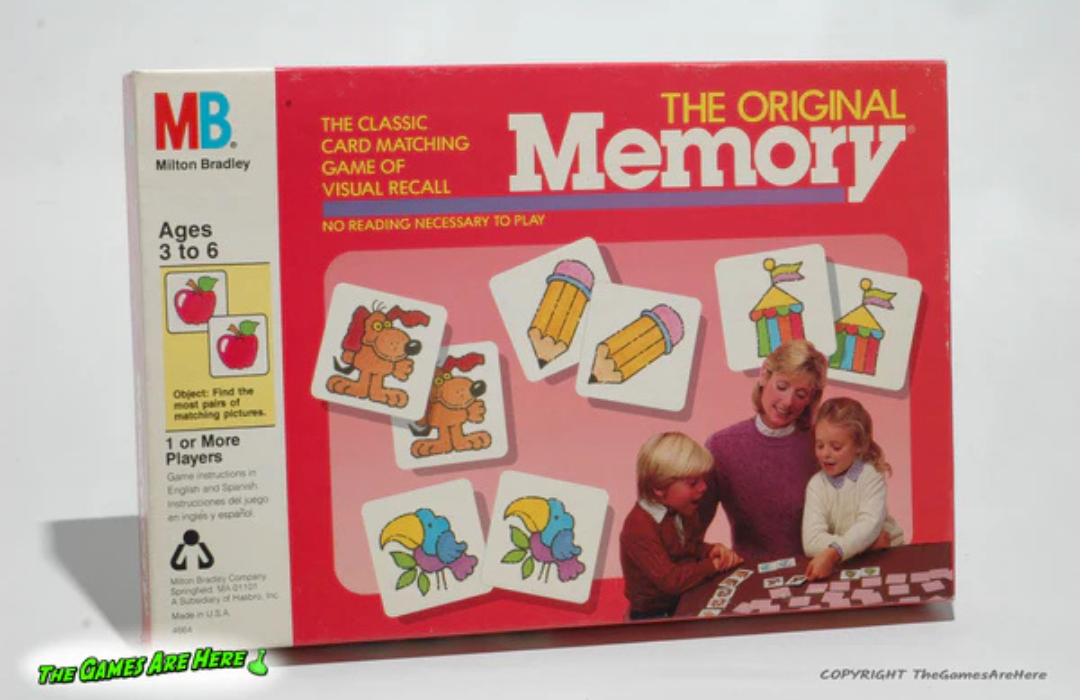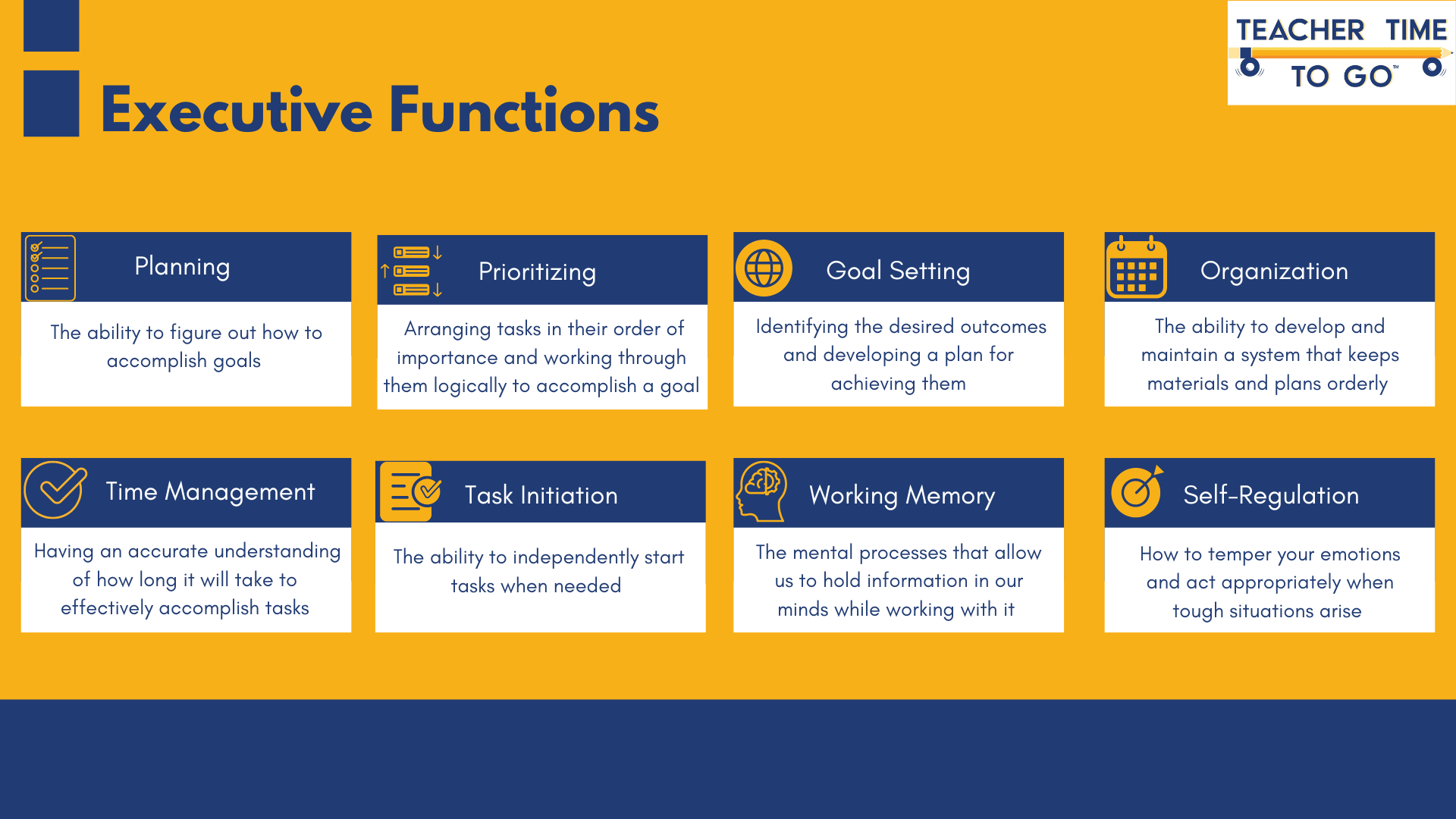Executive Functioning is best understood as the skills we use every day to learn, work and manage daily life. You can think of the term as the skills required to execute tasks.
This is the 7th post of an 8-part series highlighting Executive Functioning Skills. You will find definitions, parent recommendations and strategies that can be implemented for immediate support at home for families or in the classroom for teachers. My hope is that by helping you to understand what Executive Functioning is, you’ll be able to best support your child!
This post is all about Working Memory. Working memory is an important aspect of EF. It is defined as the mental processes that allow us to hold information in our minds while working with it. It involves the ability to hold on to information for a short period of time, process it, and use it to guide our behavior. Working memory is important for a wide range of tasks; from following multi-step instructions to solving complex problems.
In my opinion, Working Memory is the most complex of them all because it requires critical thinking skills and application. This can look like repetition, visualization, and association.
- Repeating information out loud or writing it down can help reinforce it in your mind and make it easier to remember.
- Visualizing or creating a mental picture of the information you need to remember can help make it more memorable and easier to recall later.
- Making connections between new information and something you already know can help you remember it better. For example, if you need to remember the name of a new person you met, you could associate their name with the name of someone else you know with a similar name.

First and Foremost
A strong working memory provides numerous cognitive, academic, and practical benefits across various aspects of life. Working memory refers to the ability to hold and manipulate information over short periods of time. It’s like a mental workspace where we temporarily store and process information needed to complete tasks, solve problems, or make decisions.
Key Benefits
1. Improved Learning and Academic Performance
- Retention and Recall: Strong working memory helps individuals retain and recall information more effectively. This is essential for students, as it allows them to remember facts, follow instructions, and link concepts together while studying or during class.
- Problem-Solving: A strong working memory enables better problem-solving skills. It allows students to keep multiple pieces of information in mind simultaneously while tackling complex math problems, reading comprehension tasks, or scientific experiments.
- Multitasking: Students and professionals with strong working memory can juggle multiple tasks at once without getting overwhelmed. They can switch between tasks, hold relevant information in mind, and complete tasks more efficiently.

2. Enhanced Reading and Comprehension
- Understanding Complex Texts: Strong working memory is essential for reading comprehension, especially when dealing with complex texts. It allows readers to hold multiple ideas, plot points, or concepts in mind as they read and make connections between them.
- Following Instructions: Reading often requires following complex or multi-step instructions (such as recipes, instructions for assembling things, or steps in a science experiment). Working memory allows individuals to keep all these instructions in mind and execute them successfully.
3. Increased Focus and Attention
- Sustained Attention: A strong working memory supports the ability to focus on tasks for extended periods. It helps individuals hold their attention on what’s important and filter out distractions, leading to better concentration during work, study, or social interactions.
- Task Switching: People with good working memory can switch between tasks or thoughts without losing track of what’s important. They can pause a task, process new information, and return to the original task more efficiently.
4. Stronger Communication Skills
- Remembering Conversations: Strong working memory helps individuals remember key details during conversations, such as names, dates, or topics that were discussed. This leads to more effective communication and smoother social interactions.
- Forming Coherent Arguments: In debates or discussions, people with strong working memory are better able to remember points they’ve made and the counterpoints from others. This helps them form more coherent and persuasive arguments.
5. Better Decision Making
- Weighing Options: A strong working memory allows individuals to consider multiple options and weigh the pros and cons of each decision. By holding and processing relevant information, they can make more informed, thoughtful decisions.
- Managing Consequences: People with good working memory are better able to consider the future consequences of their actions. They can reflect on past experiences and remember the outcomes of similar decisions, which helps them make better choices.
6. Improved Emotional Regulation
- Handling Stress: A good working memory allows individuals to keep their emotions in check by considering long-term goals and consequences. This helps them manage stress better and remain calm in challenging situations.
- Reflecting on Feelings: A strong working memory also helps individuals reflect on their emotions and thoughts, which is important for understanding their feelings and managing interpersonal relationships.
7. Greater Independence and Self-Efficacy
- Self-Confidence: People with strong working memory tend to feel more in control of tasks and activities because they can keep track of what needs to be done and how to do it. This sense of control boosts self-confidence and encourages greater independence.
- Goal Achievement: Because working memory is linked to the ability to organize and execute plans, people with strong working memory are more likely to set and achieve goals, whether personal or professional.

8. Social and Relationship Benefits
- Maintaining Relationships: Being able to remember key details about other people, like birthdays, preferences, or past conversations, helps in building and maintaining strong relationships. Strong working memory allows for better interpersonal communication and empathy.
- Navigating Social Situations: A good working memory also supports individuals in recalling social norms, cues, and expectations, which makes navigating social interactions easier and more effective.
Resource Recommendation
For working memory, you may remember a similar version of this when we were growing up. But this is a simple memory game that works to hold information in our minds while working with it. There are many different versions of this so you can customize based on your child’s age or interests. Enjoy 🙂

How to Improve Working Memory
- Memory Games: Engaging in memory exercises, puzzles, and games that challenge recall and cognitive flexibility.
- Mindfulness and Focus: Practicing mindfulness, meditation, and focusing exercises can enhance attention and cognitive control.
- Sleep and Nutrition: Getting enough sleep and maintaining a balanced diet are essential for optimal brain function and memory performance.
- Mental Exercises: Regularly practicing activities that require mental effort, such as learning a new language or solving challenging puzzles, can help improve working memory over time.
Final Thoughts
The biggest takeaway for Working Memory is trial and error. Do not get discouraged if
your initial strategy does not work! There are so many different resources and activities
that you can use to improve your working memory.
In conclusion, a strong working memory benefits virtually every area of life—from
academic success to emotional well-being and personal relationships. It plays a crucial
role in how we learn, process information, make decisions, and interact with others.
Next up in the series we’ll be discussing the final EF skill we focus on, Self-Regulation!
As a reminder, during this series we will go into detail about each of the Executive Functions along with a specific user friendly definition and support strategies. The chart below will guide the series!

Here at TT2G, we are working with about 500 families in the local community. Approximately 75% of our families request some sort of Executive Functioning Support. As you can see, this set of skills is a highly sought after service. Reach out to us if you feel that your child could use support in any of these areas. We have a variety of services that can best meet the needs of your student, from group workshops to individual assessment and support plans.
If you’d like to review the other posts in the series, you can find them here: Executive Functioning Overview, Prioritization, Goal Setting, Organization, Time Management, and Task Management.
Have a Working Memory Strategy that works for you? We’d LOVE to hear from you!
Live.Laugh.Learn,
Jenn

